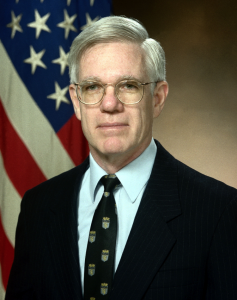Thursday, March 26th – 12:10pm
Linton Wells II, Former Principal Deputy Assistant Secretary of Defense
Dr. Linton Wells II has held civilian leadership positions in national security affairs at Senior Executive Service or equivalent levels for over 20 years. This included service as acting Assistant Secretary of Defense for Networks and Information Integration (ASD NII) and Department of Defense Chief Information Officer (CIO). In these two roles he oversaw the U.S. Defense Department’s $30 billion budget for information technology and related areas and was responsible for enhancing the Department’s networked capabilities and support structures. Other senior positions related to Command, Control, Communications and Intelligence (C3I) as well as the interface between policy and technology.
Dr. Wells transitioned from federal service in June 2014 after 51 years with the U.S. Department of Defense (DoD). At MIIS Cyber, his current research efforts focus on the relationships between cyberspace issues and C4 (Command, Control, Communications and Computers), as well as how cyberspace issues may impact, assist or thwart HA/DR (Humanitarian Assistance/Disaster Relief) efforts and peace operations.
From 2010 to 2014 he led the Center for Technology and National Security Policy (CTNSP), a research center at the National Defense University (NDU), where he was also Transformation Chair and a Distinguished Research Professor. He remains a Visting Distinguished Research Fellow at the Institute for National Strategic Studies (INSS) at NDU.
CTNSP’s research emphasizes four broad areas: (1) The integration of civil and military activities, public-private cooperation, and building communities with diverse organizations in and out of government; (2) innovative learning–tapping into the explosion of innovation in private sector adult education and applying it to national security institutions; (3) emerging challenges, such as cyber, space, energy and autonomous vehicles; and (4) science and technology, emphasizing human hardiness and chemical/biological defense.
While at CTNSP, Dr. Wells initiated the TIDES (Transformative Innovation for Development and Emergency Support) research project. This is a knowledge-sharing effort supported by DoD and other government agencies that promotes sustainable support to populations under stress – post-war, post-disaster, or impoverished, in foreign or domestic contexts, for short-term or long-term (multi-year) engagements. The project encourages unity of action among diverse organizations where there is no unity of command and facilitates public-private, whole of govenment and transnational engagement.TIDES also maintains the global STAR-TIDES network for knowledge sharing, with some 5,000 nodes from Northern Europe to Australasia. It is particularly interested in solutions that are sustainable by local populations in their worlds, with their resources, through public-private cooperation.
Dr. Wells was born in Luanda, Angola. He graduated from the United States Naval Academy in 1967 and holds a Bachelor of Science in Physics and Oceanography. He attended graduate school at the Johns Hopkins University, receiving a Master of Science in Engineering (M.S.E.) in Mathematical Sciences and a Ph.D. in International Relations. He is also a 1983 graduate of the Japanese National Institute for Defense Studies in Tokyo, the first U.S. naval officer to attend there. During his 26 years in the U.S. Navy, he served in a variety of surface ships, including command of a destroyer squadron and guided missile destroyer. In addition, he acquired a wide range of experience in operations analysis; Pacific, Indian Ocean and Middle East affairs; and C3I.
Dr. Wells has written widely on security studies in English and Japanese journals. He co-authored Japanese Cruisers of the Pacific War, which was published in 1997 and Strategic Shift, an analysis of DoD strategic guidance, published in 2013. He also co-edited a series of books on international security transformation and leader development. His hobbies include history, the relationship between policy and technology as well as scuba diving.
He received the Woodrow Wilson Award for Distinguished Government Service from the Johns Hopkins University and has thrice been awarded the U.S. Department of Defense Medal for Distinguished Public Service.


